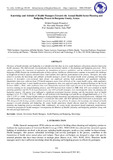| dc.contributor.author | Wamalwa, Mildred Nanjala | |
| dc.contributor.author | Wanzala, Maximilla | |
| dc.contributor.author | Alala, Benedict Ondiek | |
| dc.date.accessioned | 2023-09-25T10:20:20Z | |
| dc.date.available | 2023-09-25T10:20:20Z | |
| dc.date.issued | 2023-08-26 | |
| dc.identifier.uri | https://ajernet.net/ojs/index.php/ajernet/article/view/108 | |
| dc.identifier.uri | https://doi.org/10.51867/ajernet.4.2.30 | |
| dc.identifier.uri | http://ir-library.mmust.ac.ke:8080/xmlui/handle/123456789/2291 | |
| dc.description.abstract | The focus of health planning and budgeting is to identify priorities that, in turn, guide budgetary allocations aimed at improving health outcomes. The shift towards decentralization has necessitated reforms in the planning and budgeting processes. These reforms encompass the enactment of legislation, the formulation of process guidelines, and the utilization of program-based budgeting (PBB). Despite the institutionalization of these reforms, healthcare administrators continue to encounter the challenge of insufficient technical capacity and motivation, which hinders their effective participation in the process. Therefore, this study aimed to examine the knowledge and attitudes of health managers toward the annual health sector planning and budgeting process. A descriptive cross-sectional study design was employed, utilizing both quantitative and qualitative methods. Quantitative data were collected from 170 health managers drawn from all levels of the county health system, while qualitative data were collected from 3 county health executives. Quantitative data were analyzed using the Statistical Package for the Social Sciences (SPSS v. 29.0), while qualitative data were thematically analyzed. Fifty-eight percent of the health managers had not received training on the annual planning process, and 81% had not been trained on PBB. Only 41% were oriented on MoH planning guidelines and 40.5% on legal frameworks. Just 42% of health managers were knowledgeable about the planning and budgeting process. Chi-square tests indicated a significant association between training and the knowledge level of health managers, χ2 (1, N = 170) = 94.76, p < 0.001, as well as between the knowledge level and the use of legal frameworks, χ2 (1, N = 170) = 53.67, p < 0.001. Trained health managers displayed higher knowledge and utilization of legal frameworks. Although 93% of health managers acknowledged the process is essential for their units, only 40% affirmed their motivation to participate, and 78% disagreed with having a positive attitude toward the process. Top of Form To enhance the knowledge and attitude of health managers towards planning and budgeting, the county health department should allocate funds for training in the annual planning and budgeting process—including PBB. Additionally, the county health department should implement comprehensive orientation programs for health managers, encompassing the Ministry of Health's planning and budgeting guidelines along with the relevant legal frameworks. | en_US |
| dc.language.iso | en | en_US |
| dc.publisher | AFRICAN JOURNAL OF EMPIRICAL RESEARCH | en_US |
| dc.subject | Knowledge, Attitude, Health, Managers, Towards, Annual, Health, Sector, Planning, Budgeting, Process, County | en_US |
| dc.title | Knowledge and Attitude of Health Managers Towards the Annual Health Sector Planning and Budgeting Process in Bungoma County, Kenya | en_US |
| dc.type | Article | en_US |

